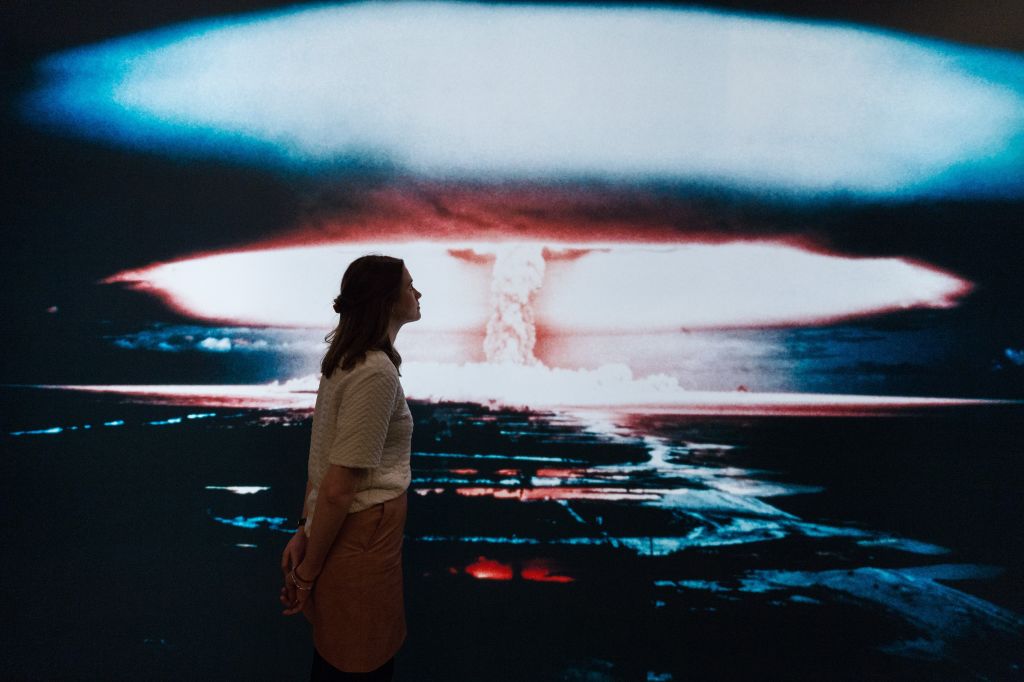
‘Give me chastity and continence, but not yet.’ — Saint Augustine of Hippo
Pondering nuclear weapons, Hugh White offers Australia a reverse Augustine: Give me nuclear chastity, until there’s no alternative.
The White version of the Australian nuke prayer is a bruising preview of the nuclear-weapons debate the country will face if things go badly in Asia.
White’s How to defend Australia set off a lot of different explosions, but the public response to his chapter on nuclear weapons was a mushroom cloud. The agonies of the arguments aroused mean this is about heart as well as head.
The explosion about nukes was as loud as responses to White on the end of the US alliance, war with China and the need to completely remake Oz strategy and the Australian Defence Force.
White dragged into the centre of the public square a nuclear-weapons discussion that’s been simmering in the quiet corner where strategists mutter strange spells.
The public square is where the stoning happens, and the rocks tossed on the potential for Australian nuclear weapons range from ‘Oh, for God’s sake!’ to dubious operational utility plus the stench of hypocrisy, and the take that acquiring such weapons would be beyond Australia’s technical capabilities and perhaps its political will.
Truly, as White observes in the first paragraph of his nuclear chapter, this is not a comfortable subject. ‘But the question is one we will not be able to avoid over the decades to come.’
White ladles on the caveats, noting that it’s obvious that Australia has been much more secure without the bomb. The changes rumbling Asia, however, mean nuclear weapons might make sense for Australia in the future: ‘The strategic, financial and moral costs of going nuclear will always remain very high, but the strategic costs of forgoing nuclear weapons in the new Asia could be much greater than they have been until now.’
In Asia’s uncertain future, White writes, an Australia deciding not to develop nuclear forces would be accepting substantially greater strategic risks.
White’s reverse-Augustine judgement reads:
[M]y own preliminary conclusion is that there are circumstances in which the development of nuclear forces could be justified, but only where the need was very clear, and where there were no alternatives. I am not at all sure that our circumstances will meet those tests, which is why I neither predict, and I certainly do not advocate, that we should acquire nuclear forces.
The big change in circumstances White posits is an Australia that no longer feels secure under the US nuclear umbrella. If Australia starts to question US extended nuclear deterrence, issues of credibility and belief will shift strategic thinking.
White quotes the deterrence equation put by Denis Healey, the UK defence secretary from 1964 to 1970, who said the Soviet Union would be deterred if it believed there was a 10% chance the US would accept the risk of massive nuclear attacks to prevent the Soviets from taking over Western Europe. West Germany was much harder to convince, though. Healey said that ‘the Germans would only feel secure if they were 90 per cent sure’.
Australia has never had to ponder too deeply whether it needs only 10% confidence in the US nuclear umbrella, or much more.
White predicts the US will have a hard time deterring China because of questions of resolve as much as power. He says that ‘no US leader wants to try convincing American voters that defending a US ally in Asia is worth risking a devastating nuclear strike on Los Angeles’.
In this bleaker future, much will depend on how Japan and South Korea react—and, for Australia, what Indonesia thinks and does. Southeast Asia’s rejection of nuclear weapons has been a huge and continuing strategic blessing for Australia.
The loss of confidence in the US—the ‘home alone’ scenario, as Rod Lyon calls it, would apply to many other powers in Asia. And, as Rod says in another of his posts (a typical example of the iron laws of Lyon logic), we’d all have to ponder an Asian nuclear cascade:
That would be a world where Japan, South Korea and Australia had shared incentives to proliferate, and perhaps Indonesia and Vietnam too; where we probably wouldn’t be the first horse out of the gate; and where we might reasonably hope to ‘share’ the challenges of proliferation with others.
Let me say that such a future world is less attractive than the one we live in now. Asia typically hasn’t put a high priority on nuclear weapons, which tend to sit in the strategic background rather than the foreground. A sudden cascade of nuclear proliferation would make for a more fraught and difficult region—which is one good reason we ought to be working harder to keep the US engaged in Asia and its umbrella business healthy.
For the agonies and the arguments of Australian nuclear weapons, here’s the fourth of Hugh White’s ASPI interviews.

